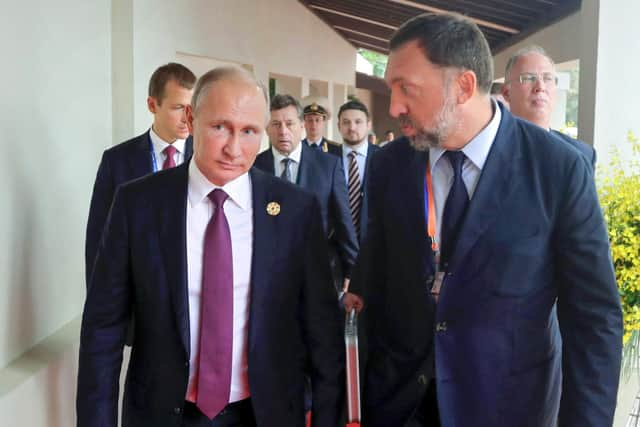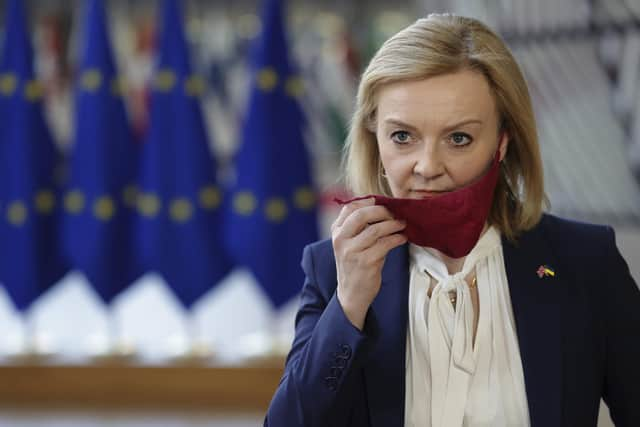Oligarchy definition: What is an oligarchy - and who are the Russian oligarchs targeted in sanctions?
The term ‘oligarch’ has been used to describe various Russia individuals who have been faced with sanctions from other countries, including the UK, in recent weeks.
But where does the term come from, and what does it actually mean?
Advertisement
Hide AdAdvertisement
Hide AdHere’s what you need to know about oligarchies and where the word comes from.


What is an oligarchy?
The word oligarchy has Greek origins, coming a combination of the word ‘olígos’, meaning ‘few’, and ‘arkho’, meaning ‘to rule or to command’.
It therefore refers to a type of societal power structure where the ruling power lies within a small number of people, who are then known as oligarchs.


Oligarchies are often categorised by one or several shared characteristics, such as but not limited to nobility, fame, wealth, education, or corporate, religious, political, or military control.
An oligarchy can refer to anywhere in the world; indeed, in the early 20th century, Robert Michels developed the theory that democracies, like all large organisations, tend to turn into oligarchies.
However, nowadays it is most often associated with Russia.
Other examples include the consolidation of power in a dominant religious or ethnic minority, such as South Africa under apartheid.
Who are the Russian oligarchs targeted in sanctions?
As an attempt to bring the Russian invasion of Ukraine to an end, world powers such as the UK and the US have placed sanctions on a number of Russian oligarchs.
The hope is that these individuals’ connections to Vladimir Putin will increase the pressure on the Russian president to bring the conflict to a close.
Advertisement
Hide AdAdvertisement
Hide AdPrime Minister Boris Johnson told the House of Commons that the sanctions levelled at Russian banks and oligarchs is part of "the largest and most severe package of economic sanctions that Russia has ever seen".
All the individuals targeted so far have close links to the Kremlin.
Their assets in the UK will be frozen and they will also face a UK travel ban.
Here is a list of the individuals facing sanctions from the British government so far:
- Alisher Usmanov, a billionaire who formerly owned more than 30% of Arsenal FC
- Igor Shuvalov, former Russian deputy prime minister and aide to Putin
- Denis Bortnikov, deputy president of the Russian state-owned VTB bank
- Kirill Shamalov, Russia's youngest billionaire
- Pyotr (Petr) Fradkov, chairman and CEO of Promsvyazbank
- Yury Slyusar, general director of United Aircraft Corporation
Advertisement
Hide AdAdvertisement
Hide Ad- Elena Aleksandrovna Georgieva, CEO of Novikombank, which bankrolls Russia's biggest defence company, Rostec
- Gennady Timchenko, billionaire and ally of Putin
- Boris Rotenberg, childhood friend of Putin and a co-owner of SMP Bank
- Igor Rotenberg, son of billionaire Arkady Rotenberg, a close friend of Putin
- Kirill Dmitriev, CEO of the Russian Direct Investment Fund
On March 10th, seven more oligarchs were also sanctioned:
- Roman Abramovich, owner of Chelsea FC with stakes in steel giant Evraz and Norilsk Nickel
- Oleg Deripaska, businessman with stakes in En+ Group
- Igor Sechin, Chief Executive of Rosneft
- Andrey Kostin, Chairman of VTB bank
- Alexei Miller, CEO of energy company Gazprom
- Nikolai Tokarev, president of the Russia state-owned pipeline company Transneft
- Dmitri Lebedev, Chairman of the Board of Directors of Bank Rossiya
UK Foreign Secretary Liz Truss told Sky News that Britain has compiled a “hit list” of Russian oligarchs who may be sanctioned down the line if the conflict in Ukraine continues.
Comments
Want to join the conversation? Please or to comment on this article.

